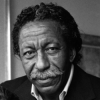Gordon Parks

Gordon Parks
Gordon Parkswas a noted American photographer, musician, writer and film director, who became prominent in U.S. documentary photojournalism in the 1940s through 1970s—particularly in issues of civil rights, poverty and African-Americans—and in glamour photography. As the first famous pioneer among black filmmakers, he was the first African-American to produce and direct major motion pictures—developing films relating the experience of slaves and struggling black Americans, and creating the "blaxploitation" genre. He is best remembered for his iconic photos of poor Americans...
NationalityAmerican
ProfessionPhotographer
Date of Birth30 November 1912
CityFort Scott, KS
CountryUnited States of America
I feel it is the heart, not the eye, that should determine the content of the photograph. What the eye sees is its own. What the heart can perceive is a very different matter.
The subject matter is so much more important than the photographer.
If a man can reach the latter days of his life with his soul intact, he has mastered life.
I've been asked if I think there will ever come a time when all people come together. I would like to think there will. All we can do is hope and dream and work toward that end. And that's what I've tried to do all my life.
The camera could be a very powerful instrument against discrimination, against poverty, against racism.
If you don't have anything to say, your photographs aren't going to say much.
At first I wasn't sure that I had the talent, but I did know I had a fear of failure, and that fear compelled me to fight off anything that might abet it.
Think in terms of images and words. They can be mighty powerful when they are fitted together properly.
I suffered evils, but without allowing them to rob me of the freedom to expand.
I suffered first as a child from discrimination, poverty ... So I think it was a natural follow from that that I should use my camera to speak for people who are unable to speak for themselves.
The photographer begins to feel big and bloated and so big he can't walk through one of these doors because he gets a good byline; he gets notices all over the world and so forth; but they're really - the important people are the people he photographs.
Photography was my choice of weapons.
I do find a certain fascination with the unpredictable. The transitory years we wade through are what they are- what we make of them.
Enthusiasm is the electricity of life